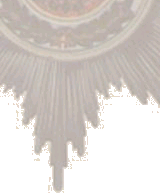|
Because of numerous questions about
the Pour le Mérite I would like to bring some light
into the darkness by pointing out the original pieces.
This web page will give you a list of original Pour le
Mérite decorations sorted by their age. Everything
besides the below shown decorations might still be
original, maybe made by a foreign manufacture, privately
made as a replacement piece for a recipient or most
likely fake.
You will see one example for each period. Those who want
to know more about the history and the recipients of the
order of the Pour le Mérite may read the general
literature.
Have fun looking and comparing. Click
on the pictures to see the detailed enlargement.
|
Why guess?! Get the expert's opinion at

|
Pour le Mérite
|
World War I decoration in
silver gilt with oak leaf, always the "938" silver
content mark. This is the Wagner made piece with
maker's mark "W".
 |
|
mark on Wagner
made piece |
|
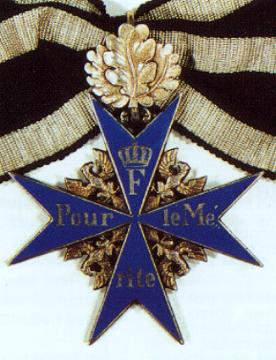 |
|
World War I decoration in
silver gilt , always the "938" silver content
mark. This is the Friedländer made piece with
makers mark "FR".
|
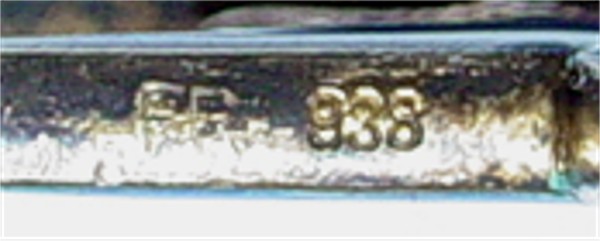 |
|
mark on
Friedländer made piece |
|
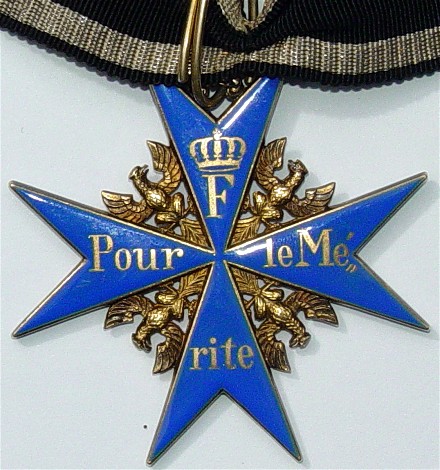
|
|
The
in-between model made by Wagner. Variation is made
from gilt silver, but made in the same fashion its
real golden predecessors were made. Two halves are
coined and put together. Those pieces are heavier
then the golden ones. Mostly marked just on the
ring for the ribbon, sometimes also on the loop
for the ribbon ring atop of the cross.
Visible
characteristics are the vent holes in the cross
arm sides.

click
to supersize |
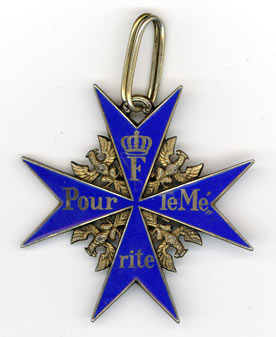
|
|
Scroll down
to the end for the Godet designed decoration.
|
|
World War I decoration in gold,
hollow construction. Read
more about the Pour le Mérite with oak leaf
awarded to General von Quast. |
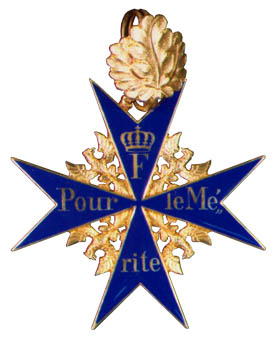
Wagner made piece
|
|
Decoration from 1866 and the
Franco Prussian War 1870/71 with oak leaf, gold,
hollow construction, letters are hand chased. |
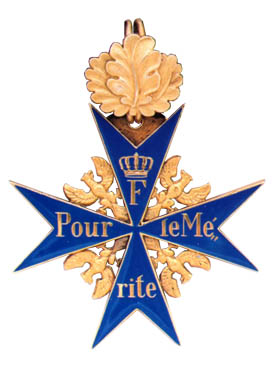 |
|
Decoration from between 1848 to
1863, gold, hollow construction, crown is hand
chased. Makers mark: H&S
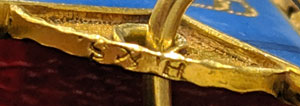 |
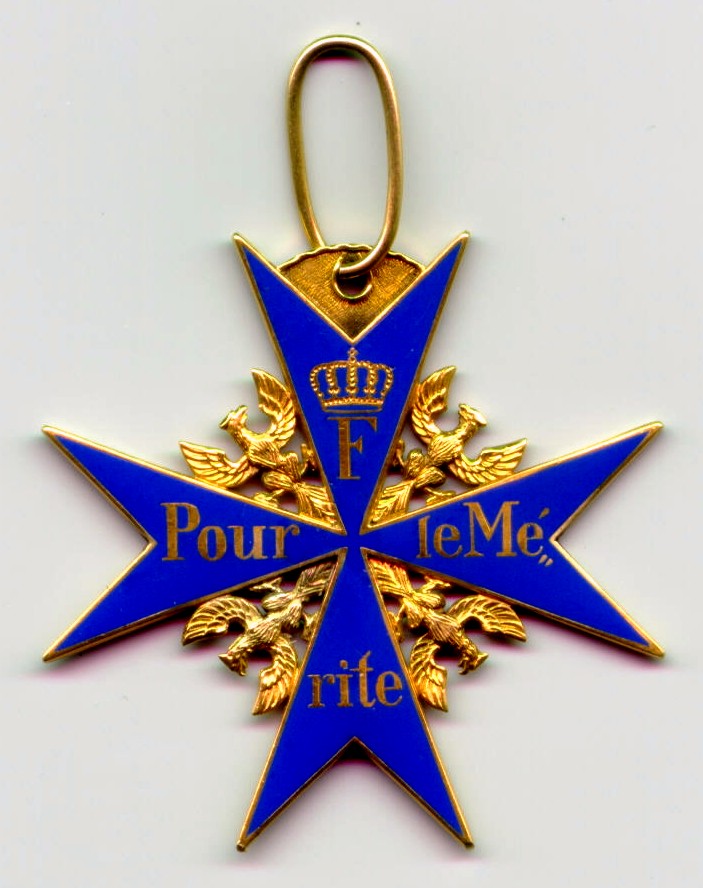 |
|
Decoration from the 1848/49 War
with crown, gold, hollow construction, letters are
hand chased. |
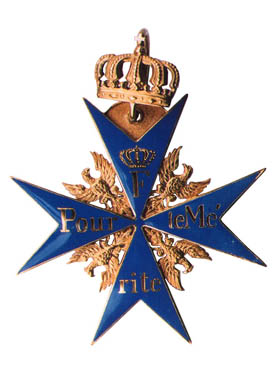 |
|
Decoration awarded during the 1813 Napoleonic
wars. Typical thin gold leaf construction with
multilayer enamel built up. |
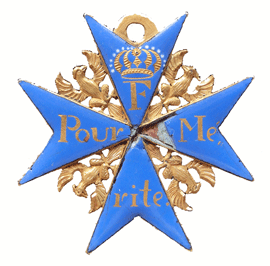
|
|
Decoration approx. 1800, the
inscription and crown are laid into the enamel
using a gold foil. |
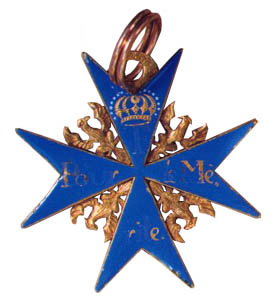 |
|
A around the century change example with Crown.
Made of very thin gold foil and multi layer
enamel. Typical damage to the center due to the
enormous tension in the enamel with almost no
support from the gold foil frame. The Crown was
awarded for a 50 year jubilee, hence in this case
in the 1850th.
This is the decoration of Freiherrn Ernst von
Klüx He received at the age of 16 in 1792 this
order and lived long enough to be awarded the crown
on July 18, 1844. He also received the Iron Cross
1st class in 1813 and was a bearer of the Red
Eagle Order 1st class.
|
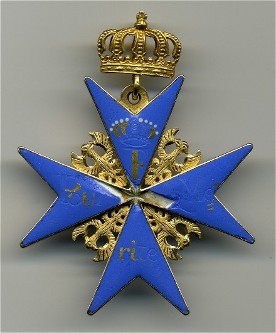
|
Pour le Mérite for Arts
and Science
|
Silver gilt decoration, silver
content mark "938" on the back of the piece. Made
after 1916 and identical with the golden piece
below. |
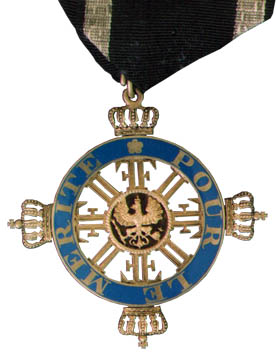 |
|
Golden decoration. Made approx.
1900. This
particular pieces was awarded in 1911 to the Danish
language scientist Vilhelm Ludvig Peter Thomsen
(January 25, 1842 - May 13, 1927) in Copenhagen. |
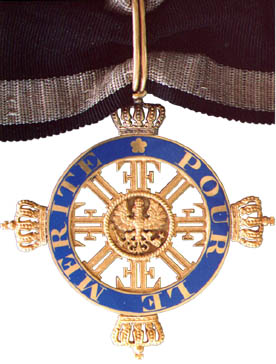 |
|
This
Pour le Mčrite was awarded to
Henry W. Longfellow in 1875. Henry Longfellow was a poet
in Cambridge, USA.
(March 27, 1809 - March 24, 1882)
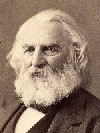
With permission of:
Longfellow National
Historic Site in Cambridge, Massachusetts, USA |
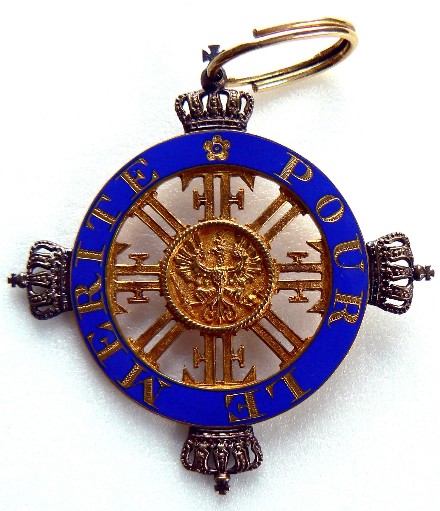
|
|
Golden decoration. Made approx.
1870. The inscription "Pour le Mérite" and the
floral elements are hand chased. The ring for the
suspension is made as a 3-dimensional orb. |
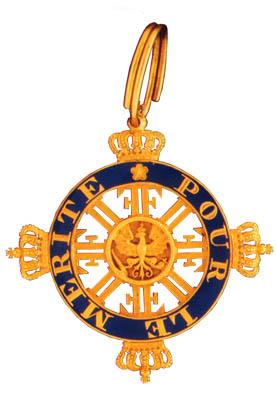 |
|
Golden decoration with Hossauer
maker's mark, letters are hand chased. Issue period.
Compared to the later pieces , the eagle in the
middle of the decoration isn't set free. That way,
the Hossauer piece has its maker's mark punched
right in the middle of the back (a). Later pieces
(eagle set free) have a golden disk attached to the
back (b).
|
(a) |
(b) |
|
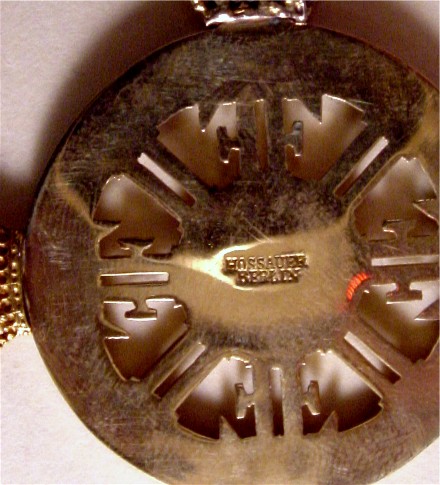 |
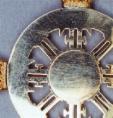 |
|
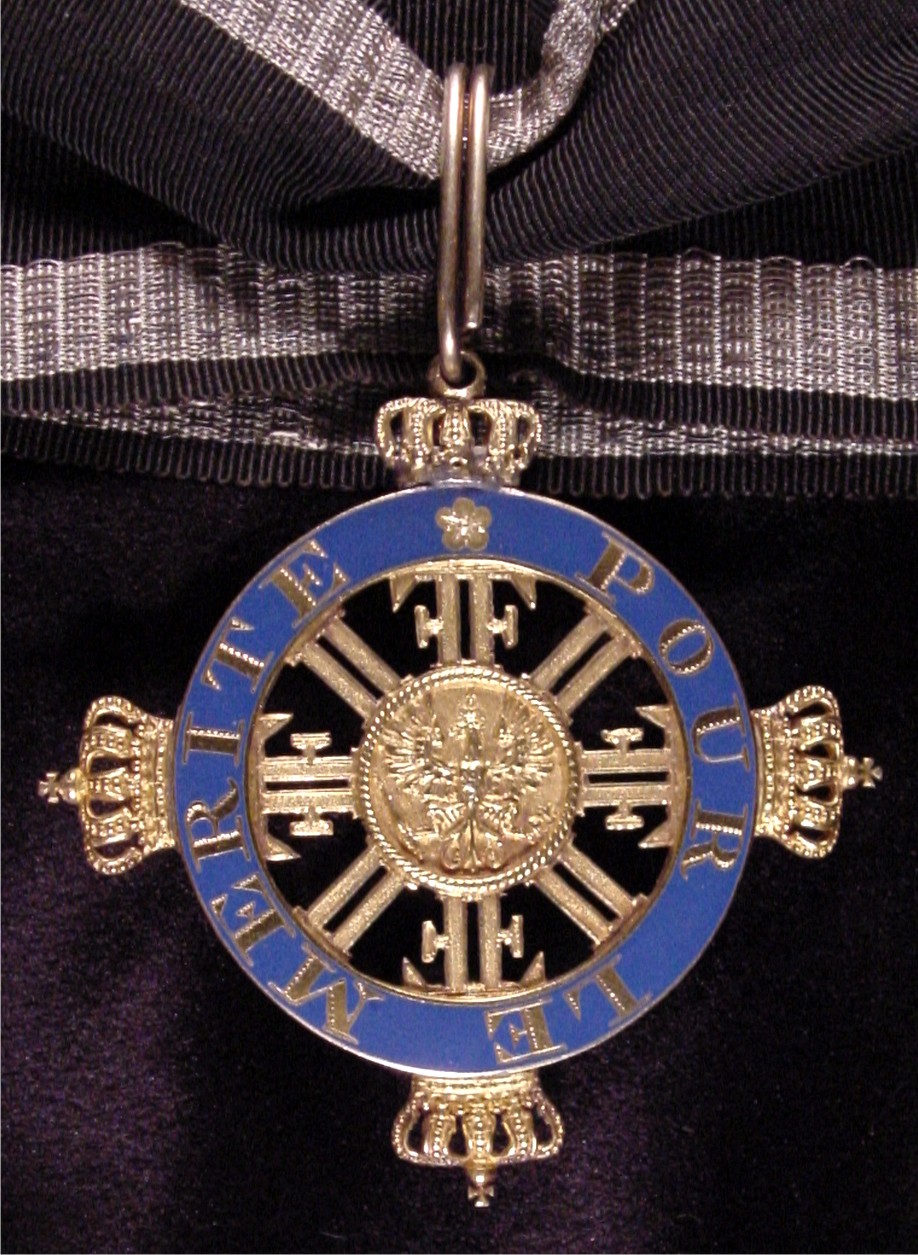 |
Some words about the designs
-
The cursive lettering style was
changed into the Antiqua font in approx. 1777
-
The light blue color of the early
Pour le Mérite changed into a deeper blue by the mid
19th century.
-
The eagles in-between the cross
arms aren't crowned. The Pour le Mérite has the
Brandenburg eagles. The fact, that insignias with
crowned eagles exists results from a shortage of
decorations, especially in 1807. A lot of decorations
were made in foreign countries, where the jewelers
made them using the Prussian eagle.
Besides above shown pieces made by those well know
jewelers like Wagner, Hossauer....I like to show a few
pictures of those pieces, that were officially made
before 1918 by the famous jeweler Godet in Berlin. Godet
offered high quality decorations for private purchase in
his shop, but was well known as a supplier to numerous
German and non German Order's Chancelleries. Find below
a picture of a Godet made Pour le Mérite, that is kept
in the official German "Zeughausmuseeum" in Berlin. The
piece was made before 1918 in silver gilt.
Godet & Sohn made Pour le Merits
before and after 1918. Several pieces are known to be
part of high profile medal groups - e.g. being part of
the British Royal collection. That piece is a decoration
made in identical design as shown above, but using real
gold and bears the makers mark "G". Silver gilt pieces
made before 1918 have to show the marks pictured below:
"J·G·u·S 938". The letters and the crown are hand
chased.
Read more about the Godet made Pour le Mérite.
Haven't you wondered about the fact,
that Pour le Mérite decorations not fitting in above
shown typology are normally sold as pieces made in the
20th or 30th?!
How many Pour le Mérite bearer had a need during that
time to get an extra one?!
© A. Schulze Ising,
III/99
|


